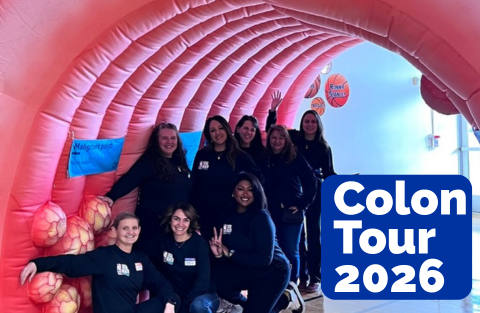FIT Testing in Nevada Above National Average
11 November, 2013
"Choice" in colorectal cancer screening encourages more patients to get screened
Despite a recent report from the Centers for Disease Control and Prevention (CDC) indicating a leveling off of colorectal cancer screening nationwide, Nevada’s screening programs are seeing some success, notably with an increase in simple at-home screening tests. From 2010 to 2012, the most recent data available, the percent of Nevadans up-to-date for colorectal cancer screening overall saw a slight increase, from 56.8 percent to 58 percent. However the rate for Nevadans up-to-date using at-home colorectal screening tests, such as the FIT test, increased from 9.9 percent to 11.4 percent over the same period.
Programs within our state, including the Nevada Division of Public and Behavioral Health’s Colorectal Cancer Control Program (CRCCP), the Nevada Colon Cancer Partnership’s (NCCP) “Choice Saves Lives” campaign, and the Nevada Cancer Coalition’s (NCC) screening pilot program have all seen positive results. Each of these programs employs shared decision-making tactics between patient and physician to determine which method of screening is best for the patient. Numerous studies, along with CDC recommendations, indicate that patients given a choice of screening via one of three proven methods increases overall screening rates versus solely the colonoscopy option.
Colorectal cancer is the second most deadly cancer for both men and women in Nevada. Yet according to the CDC, most of these deaths could be prevented if everyone over the age of 50 got screened for colorectal cancer. If detected in the early stage, treatment for colorectal cancer can be highly effective. There are often no signs or symptoms of colorectal cancer, and if left undiagnosed or undetected it can spread throughout the body. Adults aged 50 years and older should get tested with one or a combination of these screening tests:
- Fecal occult blood test (FOBT) or fecal immunochemical test (FIT) done at home every year,
- Flexible sigmoidoscopy, done every five years, with FOBT/FIT done every three years,
- Colonoscopy done every 10 years.
A colonoscopy can detect cancer early throughout the entire colon, and it can find precancerous polyps that can be removed before they turn into cancer. An FOBT/FIT is a simple at-home test that can detect blood in the stool, a possible sign of cancer. A flexible sigmoidoscopy can detect cancer early in the lower colon.
Current Programs
CRCCP works closely with NCC and NCCP to promote colon cancer screening and share resources to better serve the population of Nevada. Current programs include:
CRCCP, in partnership with Access to Healthcare Network, provides colorectal screening services to eligible men and women between the ages of 50 and 64 years who are low income (up to 250 percent of the Federal poverty level) and who have inadequate or no health insurance. Now in its fourth year of a federal grant to provide colorectal cancer screening and education throughout the state, the program shifted to “FIT first” screening in 2012 and has seen screening rates using the at-home test increase. To date the program has screened more than 1,500 clients and identified 7 percent of those with pre-cancerous polyps that were removed during colonoscopy. Three cancer cases were also identified and patients were assisted in accessing treatment resources outside the program.
NCCP, under the leadership of Reno gastroenterologist Dr. John Gray, has led the “Choice Saves Lives” campaign since 2010 encouraging primary care physicians to remind eligible patients to get screened for colon cancer and to offer those patients a choice in the type of test they’d like to use. The program, which employs webinars and in-office physician education combined with office toolkits and decision aids, will kick off 2014 with a statewide colon cancer screening challenge.
NCC, working in partnership with Community Health Alliance (CHA), piloted a program in spring 2013 to increase colorectal cancer screening rates for patients within CHA’s community clinic setting. Combining NCCP’s “Choice” message along with electronic health records management and a patient navigator, the CHA clinics saw a 300 percent increase in screening of their eligible population during the months following the program’s implementation compared to the same time period the year prior.
Additional Data
| Nevada, 2010 | Nation, 2010 | Nevada, 2012 | Nation, 2012 | |
| Up to Date with CRC Screening | 56.8% | 64.5% | 58% | 65.1% |
| Colonoscopy within 10 years | 52.5% | 60.3% | 54.4% | 61.7% |
| FOBT within 1 year | 9.9% | 11.7% | 11.4% | 10.4% |
Sources: CDC Morbidity and Mortality Weekly Report (MMWR) “Prevalence of Colorectal Cancer Screening Among Adults – Behavioral Risk Factor Surveillance System, United States, 2010”; CDC MMWR “Vital Signs: Colorectal Cancer Screening Test Use – United States 2012”
You May Also Like

Giant inflatable colons tour Reno, Carson and Las Vegas for Colorectal Cancer Awareness Month
02.27.2026
It’s not every day one can walk through a giant inflatable colon or snap a photo with a larger than life polyp.

Colorectal cancer is increasing among young people, as James Van Der Beek’s death reminds us – cancer experts explain ways to decrease your risk
02.17.2026
An increasing number of people are

New BRFSS data shows Nevada improving in cancer screening
01.29.2026
New data was recently published in the CDC's Behavioral Risk Factor Surveillance System, a phone survey of Americans covering a variety of health